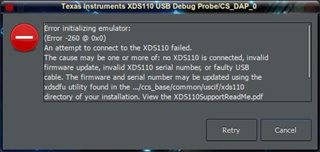I recently changed SSD drives in my laptop and installed Code Composer Studio 11.2.0 and updated Simplelink_SDK to work with an MSP432P401R board. On my prior SSD I had Code Composer Studio 9.3 installed. I can successfully build my projects on CCS 11.2.0, but attempting to flash the new executable to the MSP432 fails. The prior install was on openSUSE Leap 15.0 and then current install is on openSUSE Leap 15.4.
I can connect the MSP432 to my new setup and run the program on the MSP432 and see the terminal output in an Xterm running minicom. This works as it always has, so the USB cable, the XDS110 debug probe is fine and then MSP432's ability to communicate with the computer is fine.
However, when I attempt to flash from CCS 11.2.0, I receive the following error:
CS_DAP_0: Error initializing emulator: (Error -260 @ 0x0) An attempt to connect to the XDS110 failed. The cause may be one or more of: no XDS110 is connected, invalid firmware update, invalid XDS110 serial number, or faulty USB cable. The firmware and serial number may be updated using the xdsdfu utility found in the .../ccs_base/common/uscif/xds110 directory of your installation. View the XDS110SupportReadMe.pdf file there for instructions. (Emulation package 9.7.0.00213)

I still have other CCS 9.3 installs under Windows, so I am unsure how to proceed here. If I blindly follow the manual and change the firmware and serial number as mentioned, will that break the ability to connect from my other CCS installs? Further, since I can connect through the XDS110 (as my normal user) just fine to run the program on the MSP432 -- why is CCS 11.2.0 failing to be able to flash the newly built program using it? The error message isn't at all clear what the problem is, it just mentions a handful of things it might be? I'd rather not make things worse by trying to fix the wrong problem.
How should I go about trying to fix this to ensure I don't make things worse?

